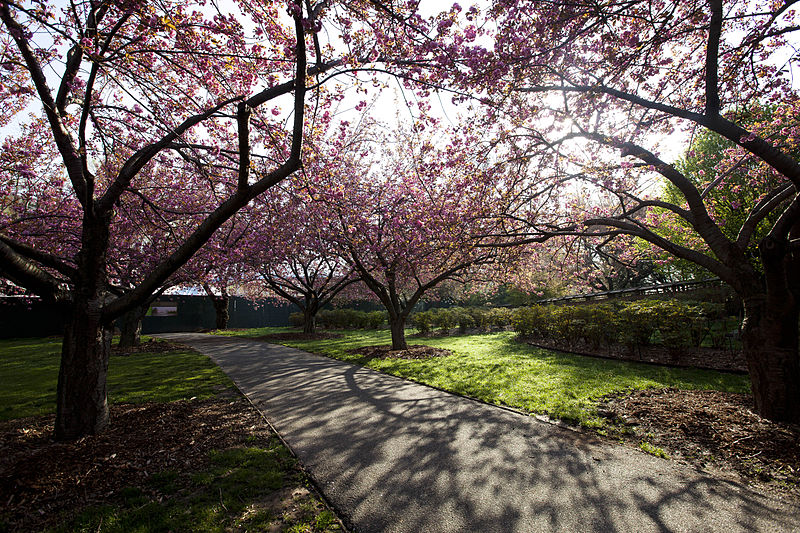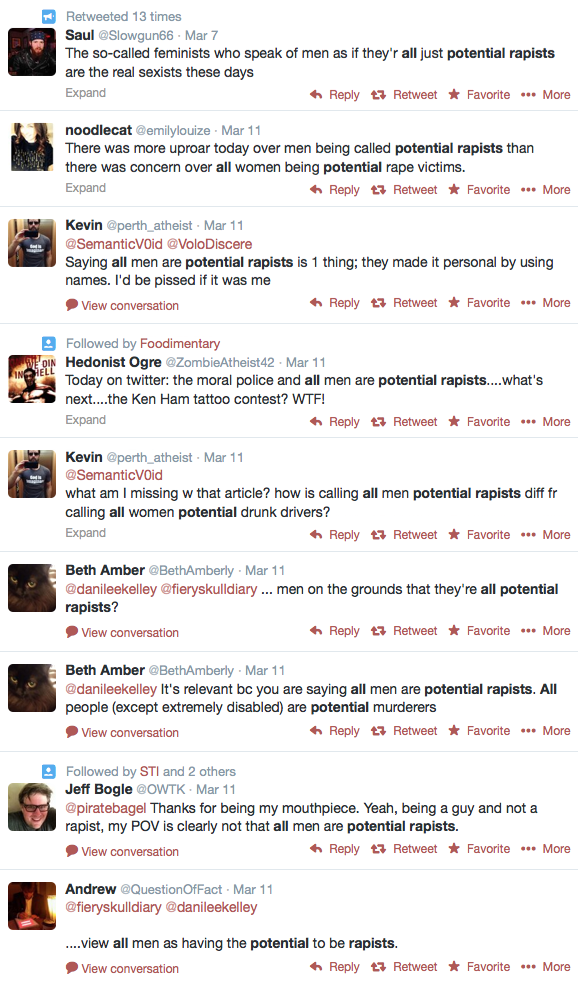Trigger warning: I know that there’s been a lot of awkward conversation surrounding trigger warnings, but I do them because I love you, and I’d rather have you prepared for what you’re going to read than spring it on you like an assh-le. So, yes – this post frankly discusses sexual violence and the pain that comes along with it, and hopefully will illuminate what I believe freedom from that pain can look like, as well. Consider this my hug and an invitation to contribute your own thoughts, but also consider this me telling you that it’s okay to turn away. I’ll still love and share my collard green recipes with you.
Last night, prompted by someone whose severe case of ‘diarrhea of the mouth’ compelled him to tweet “No one should be raped, buuut women shouldn’t dress like hoes, either,” one of my favorite twitter boos @steenfox – hereafter referred to as Steen – asked a bold question to the women following her and her friends: what were you wearing when you were sexually assaulted?
And the outpouring of emotions that ensued, my God… there’s no way that a person with even a shred of humanity could walk away from reading her timeline without feeling an overwhelming urge to cry, vomit, hug someone they love, or all three. Not only because I saw myself in so many of the stories, but because I have a 7-year-old daughter who interrupted my reading to tell me she was awake because she needed to use the bathroom. I remembered, because I marveled at how I’d realized she’d finally stopped calling it “the potty.”
I’ve talked about victim blaming, before. The implication that people are someone complicit in the crime they’ve committed, the dangers of implying that the burden lies with people to ‘play by the rules’ in order to avoid rape means that rape is the punishment – the sentence – doled out to anyone who dares break said rules, and your judge, by extension, is anyone who believes they can exert enough power over you. Literally, anyone can decide. Anyone, in any mental capacity.
The dangers of implying the burden of preventing rape lies within the potential victim – whether you see yourself as a potential victim or not is irrelevant, because victim blaming is almost always centered around women – include the reality that patriarchy wins out, here, in an obscenely creepy way. Men are never victims, as evidenced by the tone and context of the “prevention tactics.” Women should always behave as if they are potential victims. And, while the unsaid part of this sentence is “…because all men are potential rapists,” if you say that out loud, within earshot of other men, all hell breaks loose.
“There was more concern today over men being called potential rapists than there was over all women being potential rape victims.” Indeed.
What Steen’s impromptu awareness campaign did was compel people who were watching to sincerely interrogate the idea of your clothing playing a part in whether or not you should expect – no, deserve – to become a victim of sexual violence. When you read stories that include everything from “a ballgown and a full face of makeup” to “a collared blouse, a pencil skirt, I was at work and my boss did it,” to “pajamas” to “a diaper, a 15-month-old,” you have to ask questions that place your focus squarely on the attacker. And, considering our collective track record with interrogating attackers as opposed to victims, it’s clear that this is strange, hard, fearful, and rare work. Having the courage to turn to someone and say, “how could you do this to someone?” is terrifying – we might hear an answer that implies that we, too, could become victims some day.
Nonetheless, I’m off that. What I’m on, now, is healing. What I saw, as someone who’s been on twitter longer than I’m inclined to admit, is screen name after screen name of people I’d seen or been an acquaintance to for years admitting that we shared a singular, painful experience. I’ve seen people grow, change, go on to successful careers, find love, happiness, and peace. Knowing that they’ve found these things in spite of the trauma they’ve experienced gave me a different light in which to appreciate everything they’ve done. The life of a survivor is hard. Seeing that reminds me that there is hope.
When I wrote about my experiences with sexual harassment when I first moved to Brooklyn, I cannot tell you the number of times women came up to me, hugged me, said they loved the blog and “had a drop squad ready” if I needed to roll on someone. How their experiences echoed mine, how they understood, but how they were surviving, and I could, too. Even now, I smile at the thought. Not of dropping on someone, but of the solidarity. I felt it. It helped me understand that I wasn’t alone.
Community – that feeling of not being alone – is essential, because a cornerstone of victim blaming is shame, and as I’ve written before, shame is a silencing tactic. It naturally shuts down engagement, discourages you from wanting to be seen. It shuts you off from people when, quite possibly, you’re in a position where you need people the most. We, those metaphorical people, wind up failing our loved ones by being ill-equipped to support survivors of sexual trauma. How would we learn? If we’re survivors ourselves, we’ve not seen “support” displayed, and trying to embrace another survivor means responding to a barrage of questions with “I don’t know,” “I’m sorry,” and “It’s not your fault.”
…that is, if we haven’t turned into victim blamers ourselves.
Finding people to surround yourself with who understand the kind of minefield that is “surviving trauma” becomes essential. When you find yourself struggling through memories, experiences that take you back to places you’d rather not go, that community will hold you – literally and metaphorically – and help you come out of the other end stronger. That community, another word for “support system” can be virtual, and for many of us who are surrounded by people who don’t understand, have no desire to ever understand, that virtual community might be all we have… and that’s okay.
Forgiveness is vital. No, not of your attacker, but of yourself. In no way, shape or form are any of us oracles who can read minds or control the will of another human being; and, even if we were and we could, we most certainly wouldn’t make them violate us in this most personal and painful way. The choice to cruelly violate another human being was made without your insight, and without your consent. You cannot control another human being – you can only control yourself, insomuch as your attacker could’ve chosen to control themselves… and they chose wrong, for reasons that have nothing to do with you. A victim blaming world does what? Leaves us survivors blaming ourselves. We cannot heal as long as we hold these grudges against ourselves.
And, in the moments where we do grapple with self-doubt and blame, having healthy coping mechanisms is a cornerstone of healing. Self-care that does not involve self-harm, addiction, obsession, diversion, distraction, destruction, and beyond are important. Those feelings never go away – even if they only last a moment and happen in only a flash, part of what makes it less painful (and eventually painless) is a sense of understanding, empathizing with yourself, being able to remind yourself that you are still worthy of love and adoration, worthy of connection with the people around you, and worthy of being cared for and protected… even if the only people doing the protecting are you and survivors like yourself.
Speaking of protection, healing looks like setting healthy boundaries. Some things are not to be discussed with everyone, no matter how much they ask, no matter how much you think they can handle it. Some bonds between people are downright unhealthy, and we shouldn’t feel a sense of desperation to expose ourselves to someone who isn’t interested. Boundaries are about understanding that, yes, you may need to sever ties with those family members who only bring toxicity into your life, or that boyfriend who takes an active role in preventing you from bettering yourself. Boundaries are about understanding you shouldn’t share everything with everyone if you know the blowback could be more detrimental than the benefits could be great.
Boundaries are our earliest and best forms of self-protection. Being selective with who we share the most intimate parts of ourselves with – like our stories of survival and our greatest fears and our deepest emotions – means that only the people who give us their very best, treat us the best and respond to our openness with their own, in kind, are given the opportunity to bond with us. That goes for best friends, boofriends, life-long partners, and, yes, family.
Healing looks like vulnerability. Yes, the “v word” that I’ve been abusing so much lately. When the world blames you for the unspeakable acts committed against you, the implication is that you’ve left yourself vulnerable to attack somehow, so you should’ve expected to be victimized. The lesson we learn from this is to never be vulnerable. To never expose ourselves. To steel up. Be hard. The “around the way girl” who wears her brothers clothes as a means of covering up, but big bright gaudy earrings or other jewelry to still connect to her “femininity” didn’t come out of nowhere. It comes as a means of trying to appear to be less vulnerable, less of a target.
When you feel like avoiding vulnerability is the answer, sure – you might come off gangsterly, but what else do you lose in the process? You lose your ability to connect to people. You lose your ability to feel – love, sadness, excitement, pleasure, care, concern, happiness. You lose your ability to focus in on growing and maturing. That inability to feel is what drove me to my emotional eating habit – I couldn’t feel loved or happy, but a whole box of samoas could make me forget all of that for a while.
The good news, is that it isn’t gone forever. Luckily for us, vulnerability is like riding a bike – no matter how long it’s been, you never forget how to do it… even if you tip off or fall off a time or two. When you set up healthy boundaries, you foster a space where community can happen, and a support system can emerge. When you cope, together, with painful flashbacks and remind one another of the need to forgive ourselves, bonds emerge. When bonds emerge, shame dissolves. And, when shame dissolves, vulnerability brings us healing, and we can start to feel whole again, human again.
And then, we remember, that we were always human. We never lost that. We just had to find our way back to it, together.



0 comments
I’m always lurking on your site, but I had to come out and say THANK YOU. For this and other posts. THANK YOU.